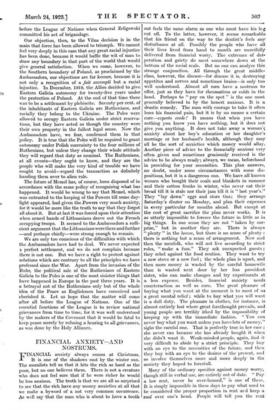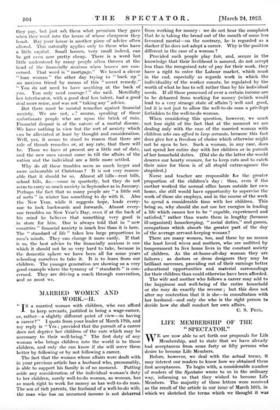FINANCIAL ANXIETY—AN]) NOSTRUMS.
FINANCIAL anxiety -always comes at Christmas. It is one of the shadows cast by the winter sun. The moralists tell us that it hits the rich as hard as the poor, but no one believes them. There is not a creature who does not feel sure that if he were richer he would be less anxious. The truth is that we are all so surprised to see that the rich have any money anxieties at all that we make a byword of a not very common occurrence. As well say that the man who is about to have a tooth out feels the same alarm as one who must have his le g cut off. To the latter, however, it seems remarkable that his friend on the way to the dentist's feels any disturbance at all. Possibly the people who have all their lives lived from hand to mouth are mercifully delivered from financial worry. The extremes of des• peration and gaiety do meet somewhere down at the bottom of the social scale. But no one can analyse this strange conjunction. All through the great middle- class, however, the disease—for disease it is, destroying appetites and nerves and sometimes brains—is only too well understood. Almost all men have a nostrum to offer, just as they have for rheumatism or colds in the head. Perhaps to " pay on the spot " is the one most generally believed in by the honest anxious. It is a drastic remedy. The man with courage to take it often loses his financial pain, but it is by no means a certain cure—experto crede ! It means that when you have nothing you know you have nothing, but it does not give you anything. It does not take away a woman's anxiety about her boy's education or her daughter's marriage or her husband's health, although they may all be the sort of anxieties which money would allay. Another piece of advice to the financially anxious very often given and sometimes graciously received is the advice to be always ready; always, we mean, beforehand in providing for your necessities. This plan answers, no doubt, under some circumstances with some dis- positions, but it is a dangerous one. We have.all known women who bought their coals and blankets in summer and their cotton frocks in winter, who never eat their -bread till it is stale nor their jam till it is " last year's." They "lay down" eggs and store tins; they arrange Saturday's clinger on Monday, and plan their expenses in every particular for months ahead. But except at the cost of great sacrifice the plan never works. It is as utterly impossible to foresee the future in little as in big things. In one sense they are not " taken by sur- prise," but in another they are. There is always " plenty " in the house, but there is no sense of plenty : there is nothing but a sense of .arrangement. Now and then the menfolk, who will not live according to strict rules, " make a fuss." They ask unexpected guests ; they rebel against the food routine. They want to try a new stove or a new fuel ; the whole plan is upset, and then more money is wasted by the careful housewife than is wasted next door by her less provident sister, who can make changes and try experiments at a less expense. Besides, financial anxiety needs counteraction as well as cure. The great pleasure of buying what you want at the moment is to most of us a great mental. relief ; while to buy what you will want is a dull duty. The pleasure in clothes, for instance, is almost entirely lost where great forethought prevails, and young people are terribly irked by the impossibility of keeping up with the immediate fashion. " You can never buy what you want unless you have lots of money," sighs the careful one. That is perfectly true in her case ; she never can because she has already bought it when she didn't want it. Weak-minded people, again, find it very difficult to abide by a strict principle. They buy with an eye to the necessities of the future, and then they buy with an eye to the desires of the present, and so involve themselves more and more deeply in the anxiety they hoped to forestall.
Many of the ordinary specifics against money 'worry, though still in verbal use, are entirely out of date. " Pay a low rent, never be over-housed," is one of these. It is simply impossible in these days to pay what used to be considered the proper proportion in rent and keep a roof over one's head. People will tell you the rent they pay, but just ask them what premium they gave when they went into the house of whose cheapness they boast. Buy your house is another piece of advice often offered. This naturally applies only to those who have a little capital. Small houses, very small indeed, can be got even now pretty cheap. There is a word but little understood by many people often thrown at the -head of the financially anxious when houses are con- cerned. That word -is " mortgage." We heard a clever " loan woman " the other day trying to " buck up " an anxious friend by means of this " secret remedy." " You do not need to have anything at the back of you. You only need courage ! " she said. Mercifully her interlocutor, with a good deal less talent, had a good deal more sense, and was not "taking any" advice.
But there must be mental remedies against financial anxiety. We are not, c,'.7 course, speaking of those unfortunate people who are upon the brink of ruin. Financial despair is of the nature of a mortal disease. 'We have nothing in view but the sort of anxiety which can be alleviated at least by thought and consideration. Well, yes, it seems to stand to reason that there are rule of thumb remedies or, at any rate, that there will be. Those we have at present are a little out of date, and the new ones cannot come in till the affairs of the nation and the individual are a little more settled.
Why do all these troubles seem so much larger and more unbearable at Christmas ? It is not very reason- able that it should be so. Almost all bills—rent bills, school bills, &c.—come in quarterly, but they do not seem to carry so much anxiety in September as in January. Perhaps the fact that so many people arc " a little out of sorts " in winter has something to do with it. Also the New Year, while it suggests hope, leads every- one to look backwards and forwards. Almost every- one trembles on New Year's Day, even if at the back of his mind he believes that something very good is in store for him. One is always told that in " new ' countries " financial anxiety is much less- than it is here. The " standard of life " takes less large proportions in men's minds. They can change it more easily. If that is so, the best advice to the financially anxious is one which it should not be so very hard to take, because in the domestic sphere we have been all for some years schooling ourselves to take it. It is to learn from our children. The younger generation are showing us a very good example where the tyranny of " standards " is con- cerned. They are driving a coach through convention, and so must we.



































































 Previous page
Previous page